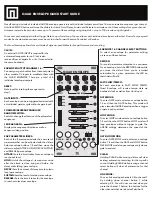
11
E
+
Normally you will want to PFL only one channel at a time.
3.3 Equalizer
Channel EQ comprises three control knobs and three switches. The tone controls enable cut and boost of
TREBLE
, MID
; and BASS
frequencies respectively (see below for specs.) EQ can sweeten or
effect a track, with the fading out and in of frequency bands being very popular.
EQ
Frequency
Range
Centre
Treble
Shelving EQ
10 kHz
+/- 15 dB
OFF
Mid
Peaking EQ
1600 Hz
+/- 15 dB
OFF
Bass
Shelving EQ
60 Hz
+/- 15 dB
OFF
Tab. 3.2: EQ frequency bands
When the KILL switches
are depressed the corresponding tone control is defeated and that band is
attenuated. It is as if the tone control is turned fully counter-clockwise. This is particular useful if you want to
bring in a new piece of music one band at the time. It is also possible for instance to mix the mid frequency
band of one track with the high and low of another. You can then reverse that very quickly.
4. MASTER SECTION
4.1 Output
Channel output level is controlled by a precision stereo 60 mm fader
.
,
The faders used are true-log faders made by Panasonic. These give ultra-smooth operation
even at low levels, on a par with those used in the most expensive studio consoles.
Channel 1 goes directly into the mix. Channels 2 and 3 go to opposing ends of the cross fader.
4.2 Cross fader
Channels 2 and 3 are selected/blended by using a cross fader, modestly legended ULTRA-HIGH QUALITY
FADER
. When set fully to the left, only Channel 2 is heard in the mix, and vice versa. We know how much
you rely on the cross fader for mixing. For this reason we have ensured that it is incredibly durable and smooth-
acting.
,
The cross fader is an ultra-high quality fader. Its Panasonic monorail design means that you
can expect a massive 200,000 smooth operations before wear & tear even becomes a factor.
4.3 Transforming with Punch
Transfroming is a DJ term used to describe the inserting of a piece of music rhythmically into another piece.
When the cross fader is to one side of the middle pushing the punch button on the opposite side will bring up
the level of that side of the cross fader. This way it is possible to punch in a piece of music, typically a certain
drum track or lyric, into the playing piece of music. Traditionally this is done by rapidly pushing the fader up
from minus infinity to 0 or +6 dB or moving a cross fader from one side to the middle to give a stuttering or
gated effect. These methods are still valid, but if you are looking for instantaneous transforming check out our
ergonomic alternative a pair of big PUNCH buttons, operating on channels 2
and 3
. We are sure
you will grow to love their speed and ease of operation.
+
This is the first time we have come across any really BIG buttons on the DX500. At this point
its worth pointing out that all the smaller switches on your DX500 are latching. This means
they stay down until you hit them again. Big buttons are all non-latching, or momentary in
4. MASTER SECTION
All manuals and user guides at all-guides.com
all-guides.com








































